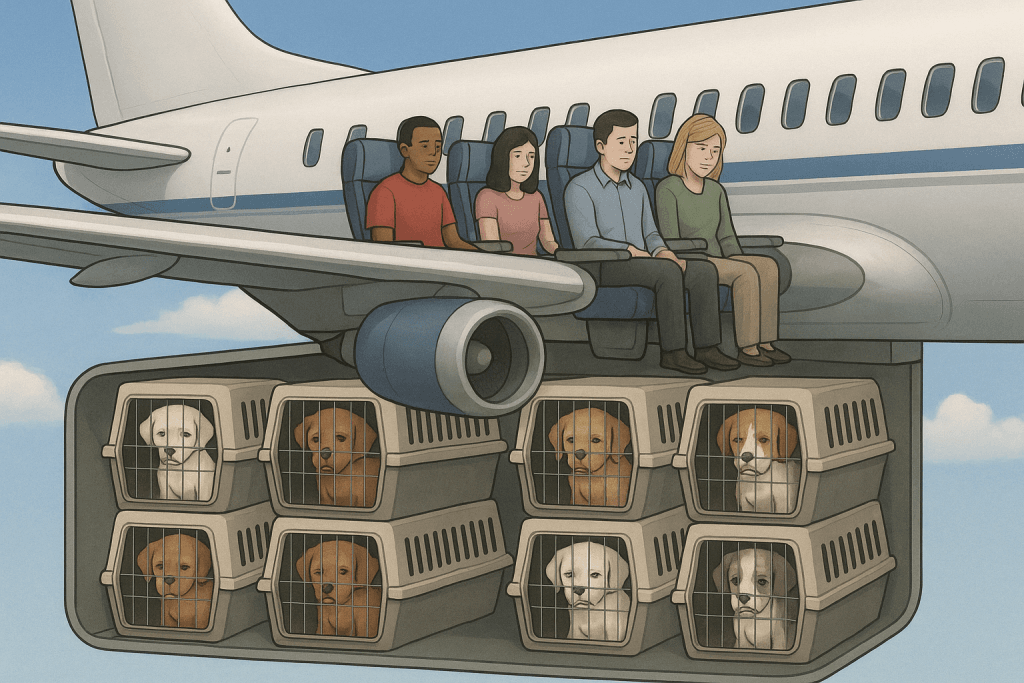Flying Cruelty: How Airlines Enable the Puppy Mill Industry
When you see a cute puppy for sale online from a breeder hundreds or thousands of miles away, there’s an invisible partner making that transaction possible: the airline industry. Commercial airlines are large contributors that enable the puppy mill pipeline. Airlines provide the transportation infrastructure that allows commercial dog breeding operations to sell their products nationwide while hiding their conditions from online consumers. These air transport services, enable the online puppy sales industry.
The Puppy Mill Pipeline Takes Flight
The reality for puppies shipped from commercial breeding operations, that can already be weakened from poor conditions at breeding facilities, are subjected to experiences that can prove to be traumatic or even fatal.
The airline industry has transformed puppy sellers limited by geography into national businesses capable of reaching buyers anywhere in the country. Airlines don’t just facilitate these sales—they are a crucial element that makes long-distance, high-volume puppy sales possible.
The system works with cruel efficiency: A family in Florida sees an adorable puppy advertised by a “breeder” in Missouri. They pay online, sight unseen. The eight-week-old puppy is loaded into a crate, driven to the airport, and shipped as cargo thousands of miles away. The buyer never visits the breeding facility, never meets the mother dog and never witnesses the conditions that produced their puppy. The airline makes makes money and the breeders charge extra for this service. The young puppies and families pay.
Enabling the Online Sales Epidemic
The explosion of online puppy sales would be impossible without airline cargo services. The internet allows commercial breeders to reach national markets, but airlines provide the physical infrastructure to deliver their products. This partnership has created a cruel synergy.
The airline industry essentially functions as the logistics department for commercial dog breeding operations, enabling them to:
- Reach customers thousands of miles away
- Avoid in-person facility inspections by buyers
- Operate from remote locations with minimal oversight
- Maintain continuous sales regardless of geographic limitations
- Present a professionalism through “safe shipping” claims
The Bottom Line
Airlines actively enable services that make online puppy sales viable. They are a part of the infrastructure that connects commercial dog breeding operations with distant consumers, eliminating the accountability that in-person on site transactions would create.
Airlines have significant power to disrupt the puppy mill industry by refusing to participate in its supply chain. They could set policies that would dramatically reduce the industry’s ability to sell puppies nationally.
Flying puppies all over the U.S. increases cargo revenue for the airlines and the industry has essentially endorsed and become partners in the puppy supply chain.
The suffering happens in breeding facilities where mother dogs are repeatedly bred and confined, but it continues in cargo holds where their puppies experience trauma during transport, and it extends into homes where families discover too late that their online purchase came with hidden costs—genetic problems, behavioral issues, and the knowledge that their desire for a specific puppy funded a system built on cruelty.
Airlines have the power to disrupt this cycle by refusing to participate. They could implement policies tomorrow that would devastate the online puppy sales industry and force commercial breeding operations to either meet higher standards or cease operations.
Some things matter more than profit. Animal welfare matters. Corporate responsibility matters. Ethical business practices matter. And consumers increasingly demand that the companies they support share these values.
The airline industry can continue enabling puppy mill cruelty, or it can choose a different path.








